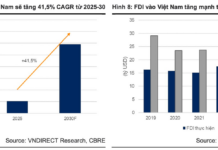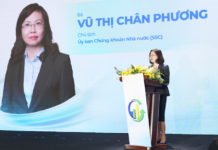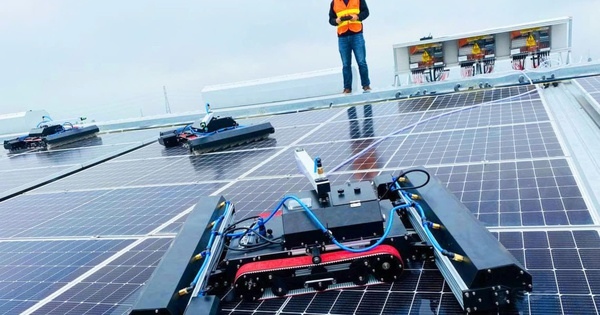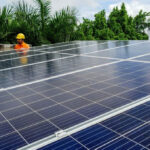At the review meeting to finalize the draft decree on self-produced and self-consumed rooftop solar power, Deputy Prime Minister Tran Hong Ha directed the Ministry of Industry and Trade, the Vietnam Electricity Group (EVN), and relevant units to calculate the load demand and system safety to adjust the “room” in planning.
Simplifying procedures and increasing purchase prices
According to the latest draft by the Ministry of Industry and Trade, organizations and individuals installing self-produced and self-consumed rooftop solar power systems that are not connected to the national power grid will be exempt from power activity licenses and given unlimited capacity development. In cases where the capacity of the rooftop solar power system exceeds 1 MW, and the organization or individual chooses to sell excess electricity to the national grid, they must obtain a power activity license as prescribed.
The Deputy Prime Minister requested the Ministry of Industry and Trade to simplify the process of issuing certificates for self-produced and self-consumed solar power systems in residential and office buildings, without creating new administrative procedures. The Ministry should also consider setting the ratio of excess electricity from rooftop solar power systems sold to the national grid at 20% of the actual installed capacity.
The Vietnam Electricity Group (EVN) will pay organizations and individuals for the excess electricity fed into the national grid at a price lower than or equal to the average electricity market price of the previous year, announced by the power system operation and electricity market unit. If this proposal is approved, the price for this source of electricity could be higher than the previously proposed fixed price of 671 VND/kWh.
Especially, the Deputy Prime Minister emphasized that there is still much potential for rooftop solar power development in the North, so there must be policies to encourage investment and efficient development. The Ministry of Industry and Trade and EVN need to review the load demand, transmission capacity, and system safety to adjust the planning, implementation plan, and “room” for self-produced and self-consumed rooftop solar power, especially in the North. “This is the basis for submitting to the Prime Minister for approval of adjustments to the national power development planning,” the Deputy Prime Minister stressed.
Statistics show that there are currently about 103,000 rooftop solar power projects in the country, with a total installed capacity of over 9,500 MW. According to the Power Development Plan VIII, the scale of this type of power source by 2030 will add 2,600 MW or reach 50% of office and residential buildings. Therefore, if the “room” in planning is expanded, the scale of this power source will increase.
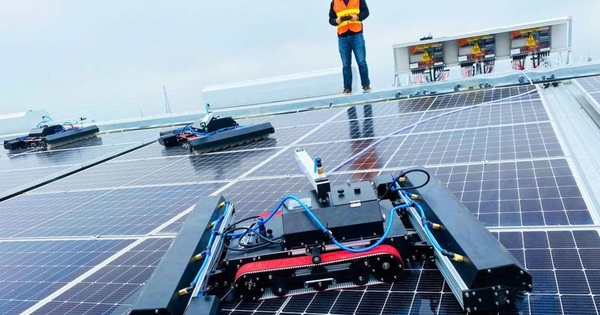
The self-produced and self-consumed rooftop solar power source may have its “room” in planning expanded, providing opportunities for individuals and organizations to develop this energy source. |
Proposal for Early Implementation
Many investors expressed their delight at this information. Ms. Cao Thi Vui, from Ha Long city, Quang Ninh province, shared that three years ago, her family invested in a rooftop solar power system costing more than 140 million VND, in return reducing their electricity bill by nearly 2 million VND per month.
Since the summer in the North is very sunny, the system produces excess electricity, so Ms. Vui hopes to sell the surplus electricity to the national grid soon to avoid waste.
Sharing the same view, Mr. Pham Dang An, Deputy General Director of Vu Phong Energy Group, emphasized that expanding the “room” for self-produced and self-consumed rooftop solar power is a crucial policy to restore production and attract orders from global brands to Vietnam. Currently, major labels such as Nike and Adidas require not only sufficient electricity but also green energy.
To implement the incentive policy soon, Mr. An proposed that the Ministry of Industry and Trade and EVN calculate the load and then report the parameters that can receive the excess electricity.
Dr. Ngo Duc Lam, former Director of the Department of Technical Safety and Environment (Ministry of Industry and Trade), assessed that considering expanding the “room” in planning for self-produced and self-consumed solar power would untie the long-standing “knot” in developing this type of energy. The Ministry of Industry and Trade had previously suggested not encouraging the purchase and sale of electricity from this source or buying it at 0 VND due to concerns that if encouraged, the capacity of this power source would exceed the figure of 2,600 MW in the Power Development Plan VIII.
In the long run, Dr. Lam recommended that EVN calculate the load, and if the system safety is guaranteed, the excess electricity purchase capacity from this source could be increased to more than 20%. He also suggested providing incentives for cases where self-produced and self-consumed rooftop solar power systems with energy storage systems are installed, treating them as baseload power sources.
“If investors install energy storage systems, EVN should buy electricity at a higher price than the average, for example, ranging from 1,000 to 1,200 VND/kWh. This is because, without this source of electricity, EVN would still have to import or buy electricity from expensive sources at very high prices,” Dr. Lam analyzed.
The General Director of the Vietnam Electricity Group (EVN), Mr. Nguyen Anh Tuan, said that the entire Northern region currently has about 700 MW of rooftop solar power, while the system capacity can accommodate up to 7,000 MW. This figure is nearly three times the development limit of 2,600 MW for the whole country.
Therefore, Prof. Dr. Tran Dinh Long, from the Vietnam Electricity Association, stated that there is no reason not to encourage self-produced and self-consumed solar power. With this type of energy, the State will not incur additional costs for building the power grid. “If every household installs rooftop solar power, it will help reduce the pressure on the electricity sector during challenging and tense periods,” said Mr. Long.
|
Controlling capacity to ensure system safety Deputy Prime Minister Tran Hong Ha noted that there must be technical management solutions to control the capacity of self-produced and self-consumed rooftop solar power sources to ensure system safety, especially for those sources connected to the medium-voltage grid (15KV voltage level). Therefore, the draft decree also supplements regulations on the acceptance of measurement systems and remote data collection; on-site monitoring and control systems, and information connection with the measurement, monitoring, and control system of the distribution dispatch level for self-produced and self-consumed rooftop solar power sources connected to the national grid. Accordingly, installed capacity below 100 KW will be connected to the system of the power unit. Installed capacity above 100 KW (whether selling or not selling excess electricity to the national grid) must be connected to the distribution dispatch system. Mr. Pham Dang An assessed that investing in additional equipment for connection would cost about 100 million VND, but this is necessary to ensure the safety of the power grid. |
|
Inclusion of rectified projects in the planning In the afternoon of August 14, Deputy Prime Minister Tran Hong Ha chaired a direct meeting, combined with an online conference with some ministries, branches, and localities, to report on issuing supplements and updates to the Plan for implementing the National Power Development Planning for the period of 2021-2030, with a vision to 2050 (Power Development Plan VIII). According to Minister of Industry and Trade Nguyen Hong Dien, many solar power projects are proposed by localities but have not been updated in the plan because they belong to the list of 154 projects without legal basis and planning, which are being investigated. The Deputy Prime Minister emphasized the principle of including in the Power Development Plan VIII implementation plan those projects that have not violated or have completed the rectification of violations and meet the criteria for system safety, transmission technology, and economic efficiency… The Deputy Prime Minister requested localities and enterprises to coordinate closely with the Ministry of Industry and Trade and investigative agencies to classify, explain, review and soon resolve. “Provinces with power projects that have fully implemented the contents according to the conclusions of inspection, examination, investigation, audit, and judgment (if any) should soon report officially to continue updating into the plan,” the Deputy Prime Minister requested. Th. Linh |
Article and photo: LE THUY
Minister of Industry and Trade: No haphazard, massive development of rooftop solar possible
The Minister of Industry and Trade mentioned that even advanced countries around the world cannot develop solar rooftop power in a spontaneous or massive manner.

















